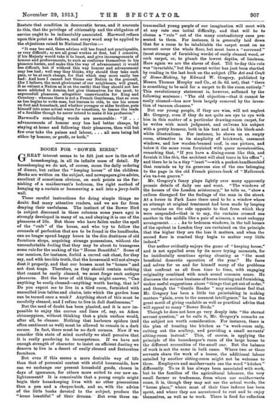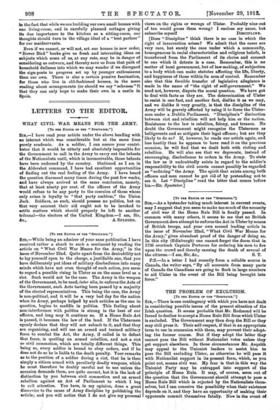BOOKS FOR "BOWER BIRDS."
GREAT interest seems to be felt just now in the art of housekeeping, in all its infinite mass of detail. By housekeeping we do not, of course, mean the daily ordering of dinner, but rather the "keeping house" of the children. Books are written on the subject, and newspapers give advice, excellent if sometimes obvious, on such points as the fur- nishing of a maidservant's bedroom, the right method of hanging up a curtain or hammering a nail into a jerry-built wall.
These careful instructions for doing simple things no doubt find many attentive readers, and we are far from denying their usefulness. The instinct of the Bower Bird (a subject discussed in these columns some years ago) is strongly developed in many of us, and obeying it is one of the pleasures of life. But those who have fallen under the spell of the "cult" of the house, and who try to follow the counsels of perfection that are to be found in the handbooks, can no longer spend happy hours in the dim dustiness of old furniture shops, acquiring strange possessions, without the uncomfortable feeling that they may be about to transgress some rule for the making of the " House Beautiful." Some of our mentors, for instance, forbid a carved oak chest, for they say, and with terrible truth, that the housemaid will not always dust it properly, and that our houses must be " homes " and not dust traps. Therefore, as they should contain nothing that cannot be easily cleaned, we must forgo such antique pleasures. But the lover of old things might answer, "Can anything be easily cleaned—anything worth having, that is ? Do you expect me to live in a tiled room, furnished with enamelled iron tables and chairs, into which the garden hose can be turned once a week P Anything short of this must be carefully cleaned, and I refuse to live in dull dustlessness."
But the seed of doubt has been planted, and it is now im- possible to enjoy the curves and lines of, say, an Adam chimneypiece, without thinking that a plain surface would, after all, be cleaner. Nothing that harbours spiders (and often sentiment as well) must be allowed to remain in a dark corner. In fact, there must be no dark corners. Now if we consider this state of mind carefully we shall perceive that it is really pandering to incompetence. If we have not enough strength of character to insist on efficient dusting we deserve to live in a desert of easily cleaned and featureless furniture.
But even if this seems a more desirable way of life than that of perennial contest with stolid housemaids, how can we exchange our present household goods, chosen in days of ignorance, for others more suited to our new en- lightenment? It is conceivable that a young couple might begin their housekeeping lives with no other possessions than a pen and a cheque-book, and so, with the advice of the little books devoted to the subject, produce the "home beautiful " of their dreams. ' But even these un- trammelled young people of our imagination will meet with at any rate one initial difficulty, and that will be to
choose a " rule " out of the many contradictory ones pre- sented to them. For instance, it is generally laid down that for a room to be inhabitable the carpet must on no account cover the whole floor, but must have a " surround " (most strange of furnishing words) of easily cleaned wood, or cork carpet, or, to plumb the lowest depths, of linoleum. Here again we are the slaves of dust. Till to-day this rule was "invariable," but the present writer has just been startled
by reading in the last book on the subject (The Art and Craft of liome-Making, by Edward W. Gregory, published by
Messrs. Thomas Murphy and Co., at 3s. 6d. net), that " there is something to be said for a carpet to fit the room entirely." This revolutionary statement is, however, softened by the following sentence : " The old objection—that it cannot be easily cleaned—has now been largely removed by the inven- tion of vacuum cleaners."
But our young people, if they are wise, will not neglect Mr. Gregory, even if they do not quite see eye to eye with him in this matter of a particular drawing-room carpet, for he writes with much judgment, and enlivens his subject with a pretty humour, both in his text and in his black-and- white illustrations. For instance, he shows us an empty room, attractive in its simplicity of brickwork, casement windows, and low wooden-beamed roof, in one picture, and below it the same room furnished with queer monstrosities,
remarking that, "If you have a dining-room like this, and furnish it like this, the architect will shed tears in his office"; and there he is in a tiny " inset "—with a pocket-handkerchief
that reminds us by its generous size of the one belonging to the page in the old French picture-book of " Malbrouck s'en va-t-en guerre."
Mr. Gregory's fancy plays lightly over many apparently prosaic details of daily use and wont. "The windows of the houses of the London aristocracy," he tells us, " show a callous disregard for the feelings of the man in the street. At a house in Park Lane there used to be a window where an attempt at original treatment had been made by looping up curtains on the side opposite to that from which they were suspended—that is to say, the curtains crossed one
another in the middle like a pair of scissors, a most unhappy arrangement. . . . As to bedroom windows, in the tall houses of the opulent in London they are curtained on the principle
that the higher they are the less it matters, and when the second floor is reached they begin to matter very little indeed."
Our author evidently enjoys the game of " keeping house,' and is not appalled even by its more trying moments, for be incidentally mentions spring cleaning as " the most beneficial domestic operation of the year." He faces and solves for us and for himself many of the problems that confront us all from time to time, with engaging originality combined with much sound common sense. He discusses the serious business of house-hunting and furnishing,
makes useful suggestions about " things that get out of order,"
and though the " Gentle Reader " may sometimes feel that Mr. Gregory has been a little too painstaking in making matters "plain, even to the meanest intelligence," he has the great merit of giving readable as well as practical advice that will appeal to many " Bower Birds."
Though he does not here go very deeply into "the eternal servant question," as he calls it, Mr. Gregory's remarks on
the subject are worth consideration. For instance, there is the plan of treating the kitchen as "a work-room only, cutting out the scullery, and providing a small servants' sitting-room instead." This, of course, is applying the
principle of the housekeeper's room of the large house to the different necessities of the small one. But the balance
of work is not the same in both cases. Where two or three servants share the work of a house, the additional labour entailed by another sitting-room might not be welcome to them. Employers and maidservants use the word " kitchen " differently. To us it has always been associated with work, but to the families of the agricultural labourer, the very small farmer or tradesman, from whom our maidservants come, it is, though they may not use the actual words, the "house place," where most of their time indoors has been spent, and where they are accustomed to rest and to enjoy themselves, as well as to work. There is food for reflection
in the fact that while we are building our own small houses with one living-room, and in carefully planned cottages giving its due importance to the kitchen as a sitting-room, our thoughts should turn to the village ideal of a " best parlour" for our maidservants.
Even if we cannot, or will not, set our houses in new order, * Bower Bird" books give us fresh and interesting ideas on subjects which some of us, at any rate, may be in danger of considering as outworn, and thereby save us from that path of household dullness into which we may wander if we disregard the sign-posts to progress set up by younger enthusiasms than our own. There is also a certain pensive fascination, for those who live in old-fashioned houses, in the mere reading about arrangements (or should we say " schemes " P) that they can only hope to make their own in a castle in Spain.



















































 Previous page
Previous page